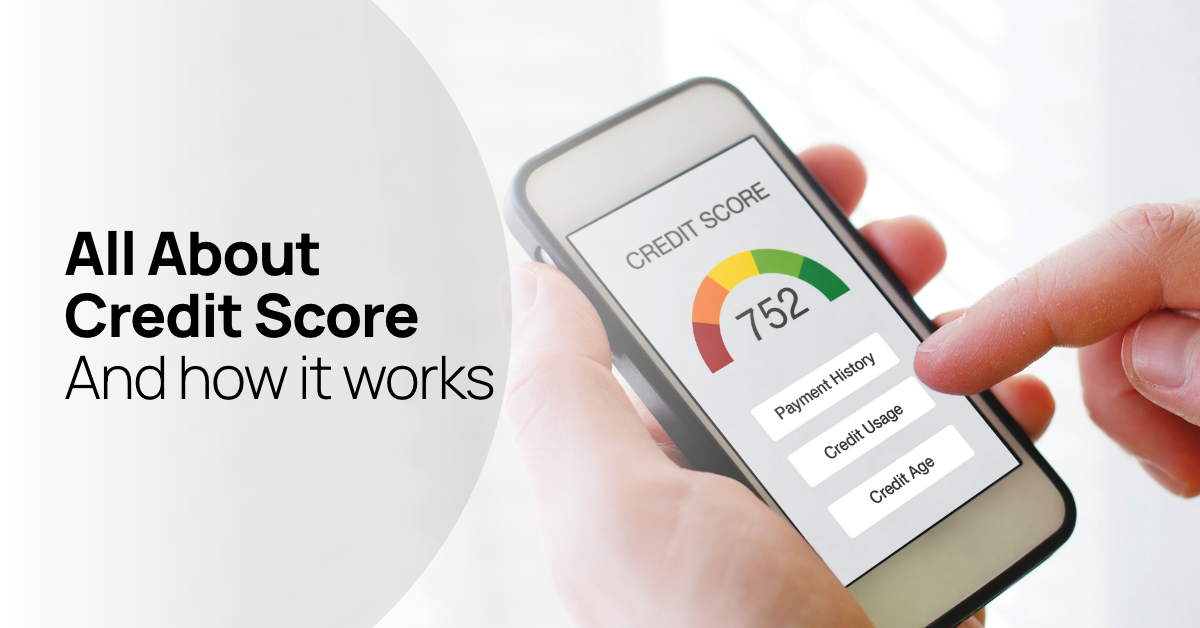What is a credit score? How does it work?
By OneCard | April 29, 2024

Imagine this: You walk into your bank with the hope that it will finance the house of your dreams. However, your banking agent starts throwing around terms like “credit score,” and you find yourself stumped and wonder what a credit score is. If you do not fully understand the intricacies of how a credit score works, don’t worry. You’re not alone. Many people face this common block that leaves them feeling uncertain during times of financial need.
In today’s financial landscape, understanding your credit score is not only an opportunity but also a necessity. With this blog, you will understand what a credit score means and how it impacts your financial prospects.
Table of contents:
What is a Credit Score?
A credit score estimates your financial behaviour as well as predicts how likely you are to repay a loan on time. It is a numerical value derived from your repayment history across various loans and credit card.
In India, the Reserve Bank of India has authorised four credit information firms. These are Credit Information Bureau (India) Limited (CIBIL), Experian, Equifax, and CRIF High Mark. CIBIL provides the most widely recognised credit score in India. The CIBIL score is a three-digit figure, ranging from 300 to 900. Banks and lending institutions look at your credit score before making a lending decision and determining the interest rate at which they give you a loan.
How is a Credit Score calculated?
While the method of calculating credit score may differ from lender to lender, it typically consider the following factors:
- Your history of repaying different types of debts, such as loans and credit cards
- The total amount of credit you owe
- The age of your credit accounts
- Your credit mix, i.e., the number of loans and credit cards you have
- Your credit utilisation rate, which indicates the percentage of your available credit that you’re currently using
Understanding the Credit Score Ranges
A credit score in India is a three-digit number ranging from 300 to 900. This infographic below displays the different credit score ranges and what they signify:
1. 800 and above (Excellent)
Individuals with this credit score are considered low-risk borrowers. They may find it easier to secure loans on favourable terms.2. 750 to 799 (Good)
Borrowers in this range tend to demonstrate a solid credit history, and lenders are highly likely to approve their loan requests.3. 701 to 749 (Fair)
A credit score falling in this range is considered fair, and lenders are likely to approve their loan.4. 601 to 700 (Low)
Those with a credit score in this range are often considered 'subprime' borrowers. Often, they face challenges in qualifying for new credit due to a perceived higher risk.5. 300 to 599 (Poor)
Individuals with a credit score in this range are most likely to encounter difficulties obtaining new credit. Therefore, it is advisable to focus on rebuilding credit rather than applying for new credit, since there is a high likelihood of rejection at this score level.ALSO READ: What is Minimum CIBIL Score for Credit Card?
How to Improve Your Credit Score
If you have questions like— what is a credit score? Or rather, what is a good credit score? Keep reading.
Here are some simple steps to gradually enhance your credit score:
1. Timely Payments
In order to maintain a healthy credit score, ensure timely payment of dues and bills by setting up reminders or utilising autopay options.2. Smart Credit Applications
Avoid unnecessary credit card and loan applications, because this triggers a hard inquiry on your credit score, leading to a negative impact.3. Regularly Check Your Credit Report
Monitor your credit report for errors and dispute any inaccuracies promptly to potentially improve your credit score.Note: Regularly monitoring your credit score or report as a soft inquiry has no negative impact. However, applying for a loan or credit card triggers a hard inquiry by the lender, which may lower your score.
4. Establish a Good Credit History
In order to become eligible for future credit needs, start building your credit history with short-term personal loans or secured/entry-level credit cards.5. Manage Credit Utilisation
Be careful about over-utilising your credit, because nothing brings down your credit score more than overdue debt. Utilise your credit limit sensibly to maintain a good credit score.6. Maintain Old Accounts
As far as possible, avoid closing your old accounts to maintain a solid and lengthy credit history. This will have a positive impact on your credit score.Remember, building a good credit score is a marathon, not a sprint. You must display accountability and constraint and have the right knowledge in order to boost your credit score and get closer to financial security. Take charge of your financial future, one wise credit decision at a time!
ALSO READ: How To Use Your One Credit Card to Build Your Credit Score
**Disclaimer: The information provided in this webpage does not, and is not intended to, constitute any kind of advice; instead, all the information available here is for general informational purposes only. FPL Technologies Private Limited and the author shall not be responsible for any direct/indirect/damages/loss incurred by the reader for making any decision based on the contents and information. Please consult your advisor before making any decision.

How Credit Card Validators Help You Prevent Financial Frauds


Sharing is caring 😉